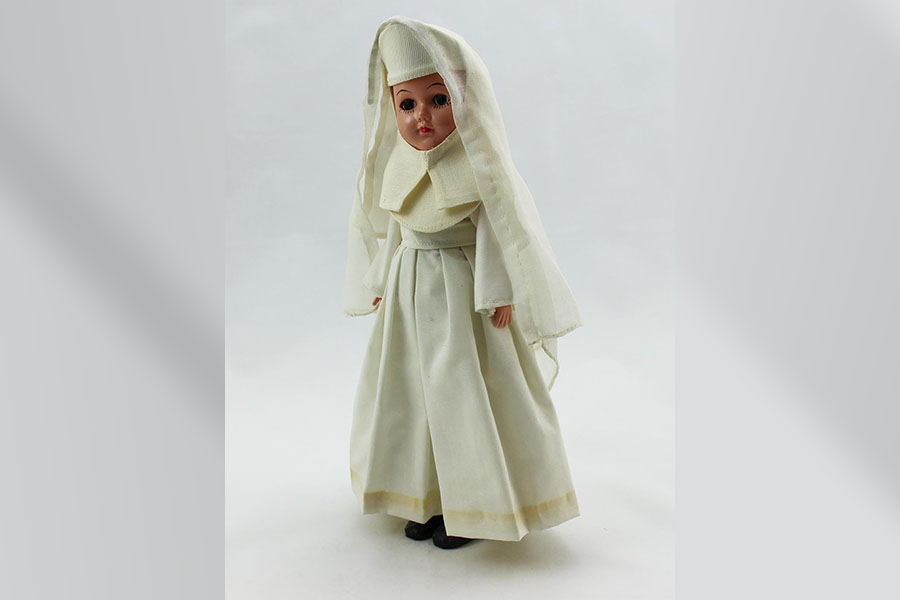Ruby is a nursing student.
She also is a doll.
In fact, Ruby is one of a collection of 54 nursing student dolls in McGoogan Health Sciences Library’s special collections and archives. The collection was donated to the library in 2012 from the Nebraska State Historical Society.
Ruby and her fellow dolls were created in a project led by Clara Siemsen, a former military nurse and nurse at Methodist Hospital, said Darby Kurtz, assistant professor, archivist and public historian at the UNMC library. Ruby herself is dressed as a nursing student from the Mennonite Hospital School of Nursing in Beatrice, circa 1911-1929, and was dressed by Elizabeth Epps (Sister Alice), a class of 1922 Mennonite Hospital School of Nursing alumna.
Nursing dolls are not new and weren’t when Siemsen began her project. The then-popular style of “Vogue dolls” Siemsen and her team used featured “Nurse Ginny” in several types of uniform and are collectibles today.
But Siemsen, who was a skilled seamstress as well as a nurse, brought a historian’s eye to the project, aiming to use the Vogue dolls to recreate real nursing student uniforms from around the state and across Nebraska’s history.
See the McGoogan Health Science Library’s digital display of the dolls.
“She just wanted to catalog the history of the uniforms,” Kurtz said. “And over the years of the project, other nurses across the state heard about it, and so they joined in.”
Siemsen and her fellow nurses eventually completed 58 dolls. The McGoogan currently holds 54 – four of the dolls featured in the collection were given to the Nebraska hospitals they represented that had associated libraries or regional museums.
The collection features student uniforms that include:
- A St. Catherine’s Hospital Sister of Mercy, the first nursing organization in Nebraska, circa 1864.
- Presbyterian (Birchmont) Hospital, Omaha, circa 1893-1924.
- Lutheran Hospital, Beatrice, Nebraska, circa 1904-1932.
- University Hospital on the medical center campus, circa 1917.
The uniforms go into the 1960s, Kurtz said, and the collection also includes some international programs and historical figures – including, of course, Florence Nightengale.
A viewer can see changes over the years, Kurtz said.
“Some of them, their uniform dresses are shorter because it’s more modern,” she said. “But even during similar time periods, every uniform across the state was different, down to the caps and the materials for their garments.”
A student of the history of textiles, Kurtz said it was fascinating to see small shifts in the uniforms from place to place and over the years.
“Just the changes to the hats, from the ruffled hat to the flat cap,” Kurtz said. “The caps themselves, that was what nursing students would wear after graduation. So, if you were at University Hospital in the 1930s, you would see nurses with all sorts of different styles of caps, because they were coming from schools all over the state.”
UNMC College of Nursing Dean Lepaine Sharp-McHenry, DNP, said nursing dolls throughout history have highlighted the evolution of the profession.
Kurtz says the project Siemsen and her collaborators undertook is of great historical value, as well.
“We can’t guarantee that all of the nursing schools cataloged what their uniforms looked like,” she said. “So, say we receive photos from a period, we might be able to more readily identify where the nurse was from, because the dolls depict the uniforms they wore. That’s not even including that the information provided with these dolls historically catalogs the names of all the schools, often identifying how long the schools or hospitals operated, and where they were located – even down to street addresses in some cases.”

This is fabulous! She understood the joy of creating.
is this a Ginny Doll, in the photo?